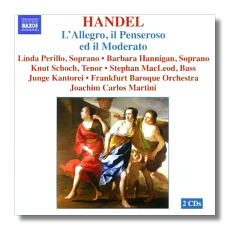
The Internet's Premier Classical Music Source
Related Links
- Handel Reviews
- Latest Reviews
- More Reviews
-
By Composer
-
Collections
DVD & Blu-ray
Books
Concert Reviews
Articles/Interviews
Software
Audio
Search Amazon
Recommended Links
Site News
 CD Review
CD Review
George Frideric Handel

L'Allegro, il Penseroso, ed il Moderato, HWV 55
Linda Perillo, Barbara Hannigan, sopranos
Knut Schoch, tenor
Stephan MacLeod, bass
Junge Kantorei
Frankfurt Baroque Orchestra/Joachim Carlos Martini
Naxos 8.557057-58 DDD 2CDs: 59:12; 71:31
Composed in 1740, L'Allegro, il Penseroso, ed il Moderato is Handel's setting of poetry by John Milton, with additional verses (in the third part of three) by Charles Jennens. This oratorio is a kind of moderated dialogue between two personalities – the merry and carefree, and the thoughtful and ruminative. Jennens added "il Moderato" – the moderate man who balances the other two types. It seems not to have been Handel's intention to instruct listeners as to the most favorable type. Instead, he must have been most attracted by Milton's poetry, and by the opportunity to compose the sort of pastoral entertainment which he had found so congenial in earlier compositions. Sometimes the third part, entirely set to verses by Jennens, is dropped. This was the case even in Handel's time; it was felt that Jennens could not hold a candle to Milton. Some of the work's first recordings (for example, a 1960 version conducted by Sir David Willcocks) do the same, and also rearrange the remaining movements. This new version is given complete, however.
L'Allegro is a like an extended sigh of pleasure. Innocence and repose are the oratorio's distinguishing features. There are high-bore recordings of this work conducted by John Eliot Gardiner and Robert King, each of them featuring singers better known than those on the present recording. There's no doubt that they are more polished representations of this work. At the same time, there is something very appealing about this intimate and relaxed reading, which was recorded "live" at a Whit Sunday concert at the Kloster Eberbach on May 19, 2002. The two sopranos, Barbara Perillo especially, are as fresh as a morning in April, and if they are not the most fluid Handel stylists, that's ok. The bass, Stephan MacLeod, has relatively little to do, and he does it well. I have a few more reservations about tenor Knut Schoch. Sometimes his tone coarsens, and his diction is below par. (Actually, the English text can be rather difficult to understand in this performance, and Naxos doesn't print it in their booklet.) The singers in the Junge Kantorei have their collective hearts in the right place, as does the Frankfurt Baroque Orchestra. (Kudos to avian flutist Marion Moonen in the extended soprano aria "Sweet bird.") Martini conducts them all with a gentle touch, which is not to say colorlessly. This is one of those recordings which is more than the sum of its parts. Except for the chorus, which comes across as somewhat woolly, the engineering is excellent.
At Naxos' price, this is a good introduction to the oratorio, and superior to the Willcocks version.
Copyright © 2005, Raymond Tuttle




















